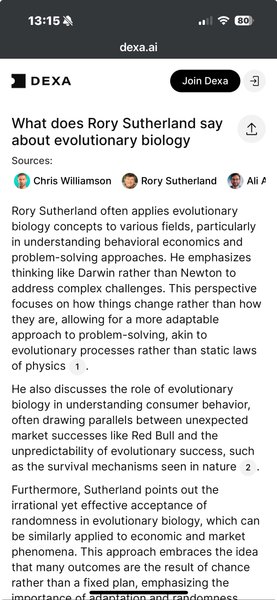Sublime
An inspiration engine for ideas
Standard economics usually assumes forward-looking agents who are intelligent enough to reason their way through any problem. These hypothetical rational agents are a bit like Star Trek’s Mr Spock: They use all available information to make the best possible decision – the one that yields highest utility.
J. Doyne Farmer • Making Sense of Chaos: A Better Economics for a Better World

At first glance, it seems strange to think of psychopaths as decision-makers.
Jonah Lehrer • How We Decide
If choice architects want to shift behavior and to do so with a nudge, they might be able to achieve this by simply informing people about what others are thinking and doing.
Richard H. Thaler • Nudge: The Final Edition
In complexity economics, agents differ and in general lack full knowledge of each other and of the situation they are in. Fundamental uncertainty is therefore the norm; ill-defined problems are the norm; and rationality is not necessarily well defined. Agents explore and learn and adapt and open to novel behavior. Outcomes may not be in
... See moreW. Brian Arthur • Complexity Economics: Proceedings of the Santa Fe Institute's 2019 Fall Symposium
‘If economics isn’t behavioural, I don’t know what the hell is.’
Rory Sutherland • Alchemy: The Dark Art and Curious Science of Creating Magic in Brands, Business, and Life
What distinguishes predictive ability is not who the experts are or what they believe, but rather how they think.
Michael J. Mauboussin • Think Twice: Harnessing the Power of Counterintuition
In the wise guys method, you look for individuals who can accurately predict how other people will bet, but whose own bet is different. The logic is that if you can predict other people's bets, then you know the common knowledge. But if your opinion is also different than everyone else's, then you must know something they don't.
Alex Pentland • Honest Signals: How They Shape Our World (Bradford Books)
After all, how plausible is it that the information processing apparatus of a mere primate would have evolved to articulate all reality?